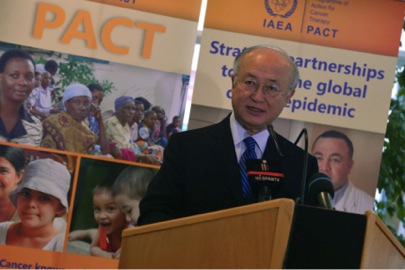2013 March Column
Reggie Annan

Kumasi. Last month on 4 February was World Cancer Day, initiated by the Union of International Cancer Control. The theme for this year was 'Dispel damaging myths and misconceptions about cancer'. Here I start with a brief background on cancers: their development, causes and progression. As usual, I begin with a very peaceful stream, pictured above.
World Cancer Day 2013
Myths and misconceptions
In the past few decades, obesity and chronic diseases including hypertension, stroke, and type 2 diabetes mellitus have become more common in sub-Saharan Africa. Likewise various cancers. Many still believe that cancer is a disease of the wealthy and elderly, that it is a death sentence and is caused by chance. Shrouding cancer in such myths has led to increased lack of awareness about the disease. Demystifying cancers and chronic diseases is essential.
How cancers develop
Cancer is a group of more than 100 diseases characterised by uncontrolled cellular growth as a result of changes in the genetic information of cells. The change may be started by external agents or by inherited genetic factors. All cancer starts when a cell begins to grow and divide uncontrollably. There are three groups of cancers: carcinomas, adenocarcinomas and sarcomas. Carcinomas are cancers originating from epithelial cells, adenocarcinomas are cancers of glandular origin such as of the breast, and sarcomas are cancers of bone and marrow. Only 5-10 percent of cancers are caused by inherited genes. The majority are caused by damages or alterations in the genetic material over time due to internal (endogenous) and external (exogenous) factors. External or environmental factors include food, nutrition and physical activity (1). The food and nutrition environment within the body influences fundamental processes within cells and this may promote or inhibit cancer development or progression.

Cancer is a leading cause of disease worldwide. A total of 12.7 million new cases occurred worldwide in 2008. Those of the lung, female breast, liver, stomach and colorectum were the most common, accounting for more than 40 per cent of all cases diagnosed. Cancer accounted for 7.6 million deaths in 2008, and is projected to continue to rise to over 11 million in 2030 (2). Tobacco use is a major cause of cancer. Alcohol, poor diet and inactivity are other main causes, as are various infections. Most cancer can be prevented.
World Cancer Day 2013
Atoms for peace

Here is the director-general of the International Atomic Energy Agency, Yukiya Amano , delivering his address during the 2013 World Cancer Day
Speaking in Vienna, Yukiya Amano, director- general of the International Atomic Energy Agency said that around 70 per cent of cancer deaths occur in lower-income countries, and many cancers respond well to treatment and can even be cured. 'Thanks to early detection and modern treatment methods, millions of men and women now live normal lives for many decades after diagnosis. Often, they die in old age of something other than cancer'.
But early detection and modern treatment methods are often not available in low-income countries as in Africa. He said that there is a lack of at least 5,000 radiotherapy machines in low-income countries. Too many people in these regions die of conditions that are treatable. He said that his agency, set up to promote the peaceful uses of atomic energy, is undertaking over 130 projects in cancer diagnosis, management and treatment in Africa and has supported low-income countries to the tune of $US 250 million in the past three decades.
World Cancer Day 2013
Support for Africa

Here is Luis Gomes Sambo, the regional director for the World Health Organization in Africa, delivering his 2013 World Cancer Day address
Luis Gomes Sambo, WHO's regional director for Africa, an Angolan citizen, said that this year's Cancer Day theme showed the need to improve awareness and knowledge about cancer. 'Cancer is a real public health problem that kills many people in the African Region… If we act now we can save about 100,000 lives annually by 2020' he said.
'There are a lot of myths and misconceptions… Cancer is not caused by an injury, such as a bump or a bruise. Cancer is not contagious. No-one can get cancer from another person'. Many cancer sufferers are diagnosed at advanced stages, due to lack of awareness and the weakness of diagnostic capacities in Africa. .From my own experience of living and working in Africa, I can confirm this. Very few people, even the highly educated, regularly have medical check-ups. People usually visit medical facilities when they are unwell. Thus people tend to know they have cancer only when the disease is at an advanced stage, when very little can be done.
Luis Sambo called on all African ministers of health to strengthen capacities for screening, early diagnosis and treatment. Governments and development partners have a shared responsibility to dispel myths and misconceptions, he said.
World Cancer Day 2013
Addressing cancer in Africa

Here now is an edited interview given by my good friend Pedro Pisa of the International Agency for Research on Cancer, who is from Zimbabwe.
What are the trends with respect to cancer in Africa?
Because of improvements in the control of communicable disease over the years, life expectancy has increased slightly in several African countries, and cancer is now one of the leading causes of death in these countries. Cancer is expected to account for more deaths globally each year than HIV/AIDS, tuberculosis, and malaria combined. In Africa, cancer currently accounts for an estimated 4 per cent of all deaths, but incidence and mortality rates for cancer are increasing rapidly. It is estimated that by 2020 there will be 15 million new cancer cases every year worldwide, and 70 per cent of these will be in lower-income countries. Over the next 20 years, it is anticipated that there will be significant increases in morbidity, mortality and economic cost due to cancer.
What challenges do researchers face when studying cancer in Africa?
The actual burden of cancer in Africa is severely underestimated. The quality and availability of existing African cancer registries is inadequate. Currently, out of 54 African countries only 5 cancer registries are of sufficient quality to be included in the IARC series Cancer Incidence in Five Continents.
What can be done to decrease the incidence of cancer in Africa?
The major challenge is a lack of research infrastructure and comparable dietary and physical activity methods across countries and regions. It is important to be able to assess diets and physical activity patterns in different cultures and populations across Africa. If valid and standardised methodologies are used across Africa, at least we would be able to gain a better understanding of ethnic differences in incidence of diseases, including cancer.
What is currently being done in Africa?
Our project, Africa's Inventory Study on Physical activity and Dietary Assessment Methods, is carrying out an inventory of existing dietary and physical activity methodologies. It will assess the availability and quality of dietary and physical activity methods. In line with IARC's mission to support cancer research and prevention in Africa, the project will be supported by the African Network, which consists of 22 countries; the international institutional network, which consists of several institutions globally; and the African Association of Cancer Registries, 60 registries within 27 countries. This inventory will support strategic plans about how resources could be best invested to support infrastructure and cancer research in Africa, drawing on the experience accumulated in Europe and elsewhere.
World Cancer Day 2013
We need information
We in Africa need more knowledge and information about cancers. Cancer is preventable. Following the theme of World Cancer Day 2013, we need to get rid of the myths surrounding cancer, such as that cancers are diseases of the wealthy and that having cancer is a death sentence. Awareness is a start. We in Africa also need more investment and infrastructure for cancer care and access for early, timely diagnoses and treatment.
References
- 1 World Cancer Research Fund/ American Institute for Cancer Research. Food, Nutrition, Physical Activity, and the Prevention of Cancer: a Global Perspective. Washington DC: AICR, 2007
- 2 Ferlay J, Shin HR, Bray F, et al. GLOBOCAN 2008. Cancer Incidence and Mortality Worldwide: Lyon, International Agency for Research on Cancer, 2010. Available from: http://globocan.iarc.fr.
Acknowledgement and request
This column has been reviewed by Geoffrey Cannon. Readers may make use of the material in this column if acknowledgement is given to the Association, and WN is cited. Please cite as: Annan R. World Cancer Day 2013. Myths and misconceptions [Column]. Website of the World Public Health Nutrition Association, March 2013. Obtainable at www.wphna.org.
All contributions to this website are the responsibility of their authors. They should not be taken to be the view or policy of the World Public Health Nutrition Association (the Association) or of any of its affiliated or associated bodies, unless this is explicitly stated.






